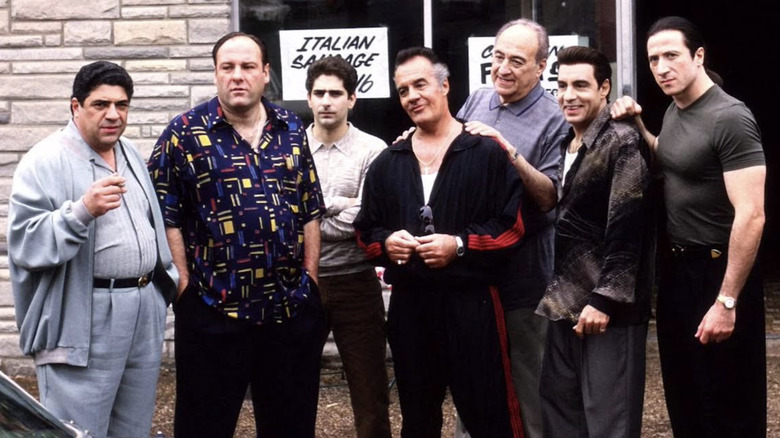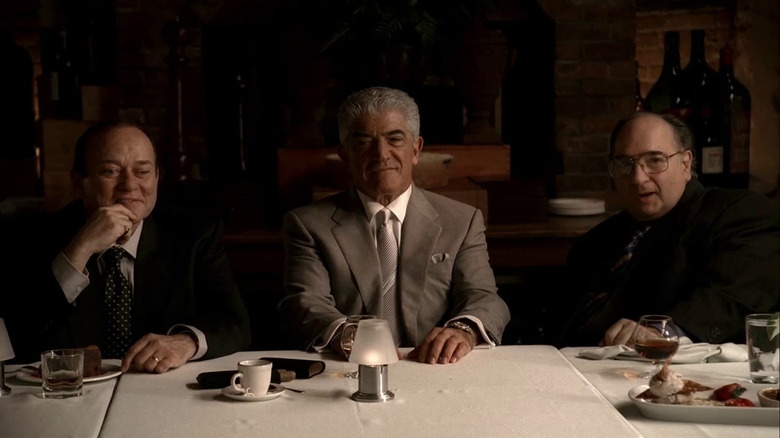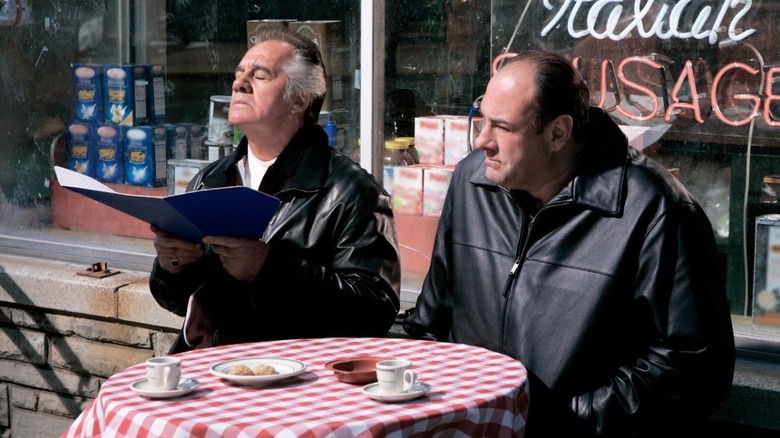The Real Mob Couldn't Stop Talking About The Sopranos – Here's Why
Organized crime has always made for good entertainment.
Our cultural obsession with movie mobsters goes all the way back to the 1920s and 1930s. The first mob movie was Josef von Sternberg's "Underworld" in 1927, and was quickly followed up by a number of pre-code crime flicks like Howard Hawks' "Scarface" and Mervyn LeRoy's "Little Caesar." By the 1980s and early '90s, mafia movies were huge crowd-pleasers. Francis Ford Coppola's "The Godfather," Martin Scorsese's "Goodfellas," and Sergio Leone's "Once Upon a Time in America" have all become revered film classics, and helped reignite interest in these stories.
In 1999, the HBO series "The Sopranos" took television by storm. It was not only the most popular series around during its airing, but it also became the hottest series of 2020 as people started bingeing it all over again via streaming, according to GQ. People just can't get enough of New Jersey mob boss Tony Soprano (James Gandolfini) and his crew of hard-hitting gangsters. The series dealt with the mundane aspects of crime as well as the glamorized parts we had seen before in the cinema, and is arguably one of the greatest television shows ever made.
One thing that helped "The Sopranos" become such a juggernaut was its undeniable authenticity. In an oral history of the series in Vanity Fair, it was revealed that F.B.I. agents had told the show's producers that they heard real mafia members talking about the show via wiretaps, and they were convinced the series had a "guy on the inside." It was so authentic that even real-world gangsters questioned just how they managed to pull it off. So how did they do it? It turns out that casting was the key to their success.
The Who's Who of Mafia Movies
One way that "The Sopranos" managed to create such incredible authenticity was by casting just about every actor who had ever been in a mafia movie. "The Sopranos" shares a whopping 27 cast members with "Goodfellas," and six of those were regular cast: Lorraine Bracco, Michael Imperioli, Vincent Pastore, Tony Sirico, Frank Vincent, and Joseph R. Gannascoli. Drea de Matteo, who played Adriana La Cerva, the girlfriend of Tony's nephew Christopher (Imperioli), told Vanity Fair that the cast didn't have to do much acting when it came to their accents or behavior:
"It never really felt like we were trying to pretend that we were in the Mafia or that we were Italian. We were just a bunch of Italians that were there. Once the show took off and I started doing press, I never even let go of who the character was. I would keep my accent and everything."
The writing team would often use their experiences around the actors in the scripts, and even took stories from the performers' lives and put them in the show. Gandolfini used to tease the writers about their tactics, telling Vanity Fair:
"I used to call them the vampires, the writers. Say, what have the vampires come up with this week? What blood are they sucking this week?"
There was one actor in particular who inspired the series because he was a real gangster, and his input truly helped set the tone and legitimacy.
Three Words: Tony Friggin' Sirico
Tony Sirico plays Paulie "Walnuts" Gaultieri, one of Tony's capos and primary enforcers. He's a fascinating character who embraces the toxic masculinity of gangsters while also being a loving caretaker for his elderly mother. Before Sirico played Paulie, however, he was a real-life criminal, with 28 arrests over the years for various charges. He was arrested for the first time at age seven, and was shot twice during his time in Brooklyn as a stick-up guy. Sirico famously only agreed to play Paulie if creator David Chase promised that he would never be a rat, and Chase agreed. Paulie became a fictionalized version of Sirico, with his obsessive neatness and maternal protectiveness written into the character.
In the Vanity Fair interview with the cast and crew, Sirico shared how bizarre it was to speak dialogue that were just his own words:
"I lived with Ma for 16 years before she passed. David knew that going in. That became one of my story lines. Sticking to the script—that was Rule No. 1. They got the words from us anyway. We'd have the writers sit and talk with us. They heard the cadence of my voice and what I said, and how I expressed myself—you know what I mean? So I had guys put down my own words and shove them right back into my throat."
Sirico grew up in a rough part of Brooklyn, where he said in order to prove yourself you either had to have "a tattoo or a bullet hole." Sirico had both. He would eventually develop his acting chops doing comedy bits for his fellow inmates during a his last prison stint in the 1970s before going on to make a career of it. Sirico is the real deal, and his knowledge and presence gives "The Sopranos" a huge dose of authenticity. Because of Sirico and the other Italian-American actors who gave a part of themselves to the show, "The Sopranos" became one of the biggest series of all time.


